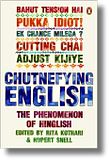Chutnefying English
Kothari, Rita [u.a.] [Hrsg.]:
Chutnefying English : the Phenomenon of Hinglish / ed. by Rita Kothari and Rupert Snell. - New Delhi [u.a.] : Penguin India, 2011. - xli, 235 S.
ISBN 978-0-14-341639-5
Rs. 299,00
US$ 17,00 (Vedams Books)
DDC: 427.954; 491.437
Beschreibung
Something has happened to English; and something has happened to Hindi. These two languages, widely spoken across India, need to be understood anew through their ‘hybridization’ into Hinglish—a mixture of Hindi and English that has begun to make itself heard everywhere—from daily conversation to news, films, advertisements and blogs.
How did this popular form of urban communication evolve? Is this language the new and trendy idiom of a youthful population no longer competent in either English or Hindi? Or is it an Indianized version of a once-colonial language, claiming its legitimate place alongside India’s many bhashas?
Chutnefying English: The Phenomenon of Hinglish, the first book on the subject, takes a serious look at this widespread phenomenon of our times which has pervaded every aspect of our daily lives. It addresses the questions that many speakers of both languages ask time and again: should Hinglish be spurned as the bastard offspring of its two parent languages, or welcomed as the natural and legitimate result of their long-term cohabitation? Leading scholars from literature, cultural studies, translation, cinema and new media come together to offer a collection of essays that is refreshingly new in thought and content. [Verlagsinformation]
Besprechung von Balwinder Kaur, in: The Tribune, 10. Juli 2011 [Online verfügbar].
Herausgeber

RITA KOTHARI heads the communications area at the Mudra Institute of Communications, Ahmedabad, and is a Columnist for Ahmedabad Mirror. Her publications include Translating India: The Cultural Politics of English and The Burden of Refuge: Sindh, Gujarat and Partition.

RUPERT SNELL is the director of the 'Hindi Urdu Flagship' intensive Study programme at the University of Texas, Austin. His translations include In the Afternoon of Time, the Autobiography of Harivansh Rai Bachchan, published by Penguin. Profile page (Dep. of Asian Studies); profile page (Hindi Urdu Flagship).
Quellen: Penguin India; Vedams Books; WorldCat; Hindi Urdu Flagship; Amazon; Exotic India

